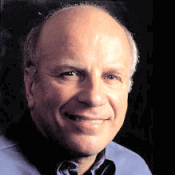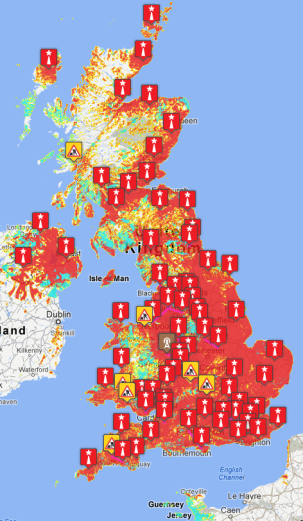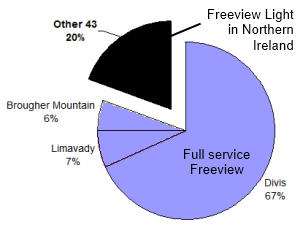Will there ever be more services on the Freeview Light transmitters?
 Brian Butterworth published on UK Free TV
Brian Butterworth published on UK Free TV The digital terrestrial service that is known today as Freeview, started life in Parliament as the Broadcasting Act 1996.
Part I act gave the regulator, then the Independent Television Commission, the authority to establish digital terrestrial television services in the UK, and paved the way for a "six multiplex" service. One multiplex was reserved for the BBC, a second jointly between the "Channel 3 licence holder", Channel 4, Gaelic programming in Scotland plus Teletext UK as the "national teletext provider"
One half of the third multiplex was passed to Channel 5 and the S4C Corporation, with the remaining three and a half being put up for a public auction. The ITC duly awarded the remaining three multiplexes to "British Digital Broadcasting" in 1997, which was a combination of two big ITV companies at the time, Carlton and Granada.

On Sunday 15th November 1998, the services was launched under the name "ONdigital", a mixture of free-to-air and pay services, and rather dwarfed by the launch six weeks earlier of the much superior Sky Digital service.
ONdigital renamed itself ITVdigital on 11th July 2001, but the woollen monkey toy in the adverts proved more popular than the service, and the service closed on 1st May 2002.
 It became clear (especially to BBC director-general Greg Dyke, pictured right) that the digital terrestrial service was popular with viewers, but it was unsuitable as a pay-TV platform.
It became clear (especially to BBC director-general Greg Dyke, pictured right) that the digital terrestrial service was popular with viewers, but it was unsuitable as a pay-TV platform.
 ITVdigital handed back three multiplex licences to the ITC, and the ITC then re-awarded one to the BBC and the other two to Crown Castle International, a company formed when the BBC's engineering division was sold off.
ITVdigital handed back three multiplex licences to the ITC, and the ITC then re-awarded one to the BBC and the other two to Crown Castle International, a company formed when the BBC's engineering division was sold off.
A company, DTV Services, formed to publicise the new service, which was now called Freeview.
Sky joined in, and purchased slots on the new service (from CCI) for Sky News, Sky Sports News and Sky Travel. Also there from the start of Freeview was Flextech Television "ftn", music channel TMF, UKTV's UK History and UK Bright Ideas, and shopping channel, QVC
Digital switchover process
When it was decided that the analogue television signals would be turned off, the BBC, as it funded by a universal fee decided that it must provide the two multiplexes of services to all homes. Ofcom, now the regulator, decreed that the multiplex shared by Channel 3 and Channel 4 (called "Digital 3 and 4 Ltd") must also provide service to all homes that had analogue. This was because Channel 4 already provided this level of coverage, and as the licence holder for Channel 3 has "public service obligations", the broadcasting of multiplex 2 should also extend to all existing TV masts.
Ofcom, now the regulator, decreed that the multiplex shared by Channel 3 and Channel 4 (called "Digital 3 and 4 Ltd") must also provide service to all homes that had analogue. This was because Channel 4 already provided this level of coverage, and as the licence holder for Channel 3 has "public service obligations", the broadcasting of multiplex 2 should also extend to all existing TV masts.
However, for the commercial multiplexes, Ofcom simply invited Crown Castle Ltd and S4C Digital Networks (SDN) to apply to extend their networks. Ofcom, having granted the multiplex licences already, felt it had no legal power of compulsion to insist more homes were served, and in December 2006 announced that no application had been received - at this point Ofcom no longer planned for additional frequencies for the commercial multiplexes.
Both commercial operators decided that the cost of providing the equipment, installation and ongoing operation of services from the 1,000 smaller transmitters would cost more than any additional revenue they could get from the TV channels that rent their broadcast capacity, as the work would only expand the actual number of homes broadcast to by 9%.
Since this time, S4C Digital Networks multiplex was bought by ITV plc, and Arqiva acquired the CCI multiplexes. For this reason the commercial multiplexes are known as SDN, ArqA and ArqB.
 The map shows the locations where Freeview Light service is generally the only Freeview reception option.
The map shows the locations where Freeview Light service is generally the only Freeview reception option.
See also: Where are the public service (Freeview Light) transmitters?
10:12 PM
Why have you left out Northern Ireland in the coverage map Brian ? Apparently, we're plauged far more with the Freeview Lite problem than the rest of the UK.
Also, wasn't part of the problem with ITV Digital the fact that they paid far to much for football rights ? I seem to rememeber that this was the eventual reason for it's demise.
| link to this comment |
Peter Henderson: The map I had to hand doesn't cover Northern Ireland, but 80% of homes there will have the full service. See Where are the public service (Freeview Light) transmitters? | ukfree.tv - independent free digital TV advice .
The reason for ITV Digital going under was complex, if you want me to go into it I can, I was there!
| link to this comment |
I wonder how this freeview light service compares with DTT in say Germany or France etc. Do all small relays get the same number of channels ??
| link to this comment |
9:39 AM
I think the relays have 4 channels now some have 5, so I think 4 or 5 digital muxes should be provided from them.
This would have meant most of us would not have noticed relays had less programs than the main transmitter sites.
This Light situation is just another let down in the digital system we have.
One thing we have commented on in other Subjects of course is the switchover Main stations are going further than we ordinary folk expected so it might be possible on those using relays to use the main station which for anologue they could not get.
| link to this comment |
11:56 AM
Dave: In Germany the COM muxes are only available in urban areas. Another interesting point about Germany is that starting in 2013 all households will have to pay for a TV licence whether they have a TV or not.
| link to this comment |
1:17 PM
I don't agree that Ofcom couldn't legally require the operators to operate from more stations. The multiplex licences came up for renewal recently. Under section 10(3)(a) of the licences, Ofcom *could* have required a new Technical Plan from each licensee, and under 10(3)(b) could have required that that Technical Plan include all the relay stations.
If the current licensee didn't like this, they could simply have not renewed the license, and Ofcom open a new auction. Obviously it would be a gamble that anyone would take up the option to use all sites, but Ofcom certainly could have tried.
SDN renewed in 2010 so this process can't be done again until 2022. Ofcom's consultation on renewing ArqA and ArqB closed two weeks ago - the licences themselves won't expire until 2014. The outline plan is to *remove* terms from the licence, though, for example removing the requirement to fund and promote the DTT platform through the 'Freeview' company.
| link to this comment |
Mike Dimmick: I suspect that if Ofcom had made changes to the terms of the licence during the licence period (rather than now, at the end), they would have been threatened with a judicial review and so the lawyers would have probably advised against it.
I have to say I am somewhat concerned that operator licences are getting rolled-over automatically.
The relationship between Ofcom and Arqiva is very troublesome here, in particular.
Arqiva own the two multiplexes, and they also own all of the masts - New transmitter monopoly | ukfree.tv - independent free digital TV advice - it would be so uneconomical for another company to construct over 80 new masts to run the multiplexes independent from Arqiva, and Ofcom seems to use Arqiva for "independent advice".
This is a very troublesome situation, as the market is supposed to sort out these problems, but the regulator and monopoly company seem to be sleeping with each other (to mix metaphors for a moment).
| link to this comment |
A two tear TV service, deserves a two tear TV licence fee level.
There is no way to check if some viewers are getting the full service or a particle one.
So channels that are not available from all transmitters should be subscription channels.
The whole subscription should be put aside to improve the network and NOT paid to the TV channel owners.
Also a large yearly fee should be paid to the Government from the com channel to improve the network.
Channels on the national network should be free from the subscription and Government fee.
If we did this it would not be long before the channels on the com multiplexes wanted their network increased to the whole nation.
I may be lucky if a new local TV station starts from Haywards Heath.
But will it be transmitted from the Haywards Heath relay or will it be from Heathfield.
If its transmitted from Heathfield then the Haywards Heath channel will not be available to many people in Haywards Heath.
| link to this comment |
Mark's: mapM's Freeview map terrainM's terrain plot wavesM's frequency data M's Freeview Detailed Coverage
7:08 PM
Briantist: As part of the Competition Commission's inquiry, Arqiva had to submit Undertakings which basically say that they aren't allowed to discriminate between customers, and any new entrant would have to be charged the same as they would charge themselves for Network Access.
http://www.competition-co….pdf
An Adjudicator for Broadcast Transmission Services was set up to monitor Arqiva's behaviour: Welcome | Adjudicator for Broadcast Tranmission Services . Their 'Contact Us' link suggests it is three people working out of Ofcom's offices though!
| link to this comment |
7:15 PM
Mark A: No, it doesn't deserve a two-tier licence fee because the licence fee funds the BBC - and all their channels are on one of the three public-service multiplexes.
UKTV, which is a joint venture of the BBC and (now) Scripps Network Interactive and runs Dave, G.O.L.D., Yesterday and Really on Freeview, contributes money back to the BBC, reducing the licence fee.
The black-and-white fee should be scrapped. All transmissions have been colour for over 25 years.
| link to this comment |